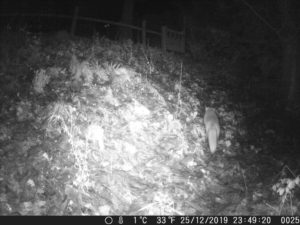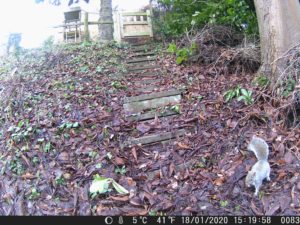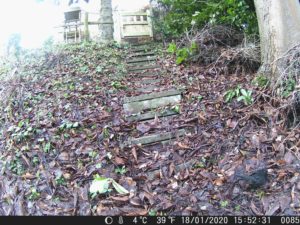Absence of evidence or evidence of absence is a common scientific discussion point. How can badgers help us understand it more clearly.
When we moved into our house, our neighbour told us that he often saw badgers in his garden. “Great”, we said, hoping we’d see them gamboling outside our living room each evening. Five years on, we’ve still not seen one. My husband is ever the optimist about this, so he got me a wildlife camera for Christmas. It has night vision, and a movement sensor which triggers the camera to record about 30 seconds of video. I fixed it to a fence post at the bottom of the garden near the river and on Christmas evening, it caught a creature. A badger? Nope. Just the fox.

I then tried various places in the garden where I thought we might catch the badgers (or other wildlife). I left it on a gate with a broken latch during high winds by mistake and got lots of camera swinging. Perhaps the badgers were riding on the gate out of shot. I experimented with placing the cameras at different heights. I didn’t get much apart from the moggies slinking about. I then left it for a week in its original position and eagerly examined the photos.
Any badgers?


Nope. So, now I am debating with my husband: do we have badgers or do we not? Can we conclude anything from the available evidence? This is a recurring theme in science and scepticism: is it absence of evidence or evidence of absence? Just because we have no badger picture evidence, it doesn’t prove that they are absent from my garden. You can imagine a similar argument being made about Yetis or Nessy, or even about the effects of homeopathy. However…this argument is often used incorrectly to support misleading conclusions. It’s often used as a plea to give a mysterious but unlikely sounding claim the benefit of the doubt.
It is possible that dragons exist. But it is vanishingly unlikely given the prior evidence, and the lack of theoretical explanations for how reptiles could breathe fire. So I rate the odds of catching a dragon on my wildlife camera as minimal. On the other hand, it is well documented that badgers do exist, and there are reports of badgers along the river where I live (from sources in addition to my neighbour). So the odds of them trotting through my garden are reasonable, but at the moment it is inconclusive because the evidence is of low quality. If I was thorough and systematic about my data collection (perhaps with more cameras, perhaps over a longer time period, perhaps taking into account other sources of evidence such as tracks or droppings) I might yet record a badger visitor. If I was diligent about my data collection and still didn’t spot a badger, I would lower my certainty about this being a badger haunt. I couldn’t ever definitely prove that there are no badgers here, which is fine by me as I like to hold out a tiny little bit of hope that they might one day move in.



